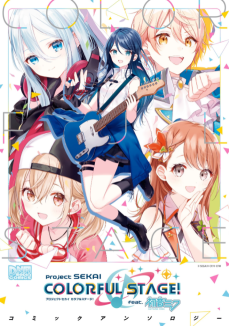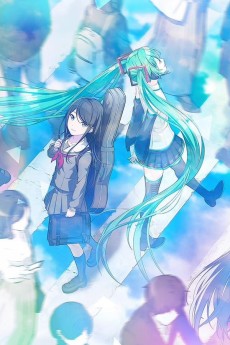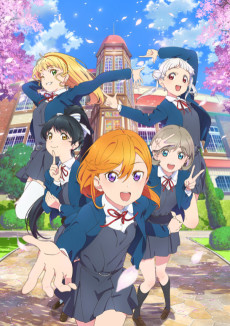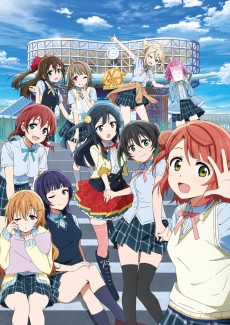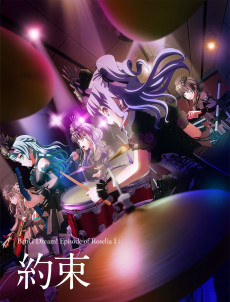PROJECT SEKAI: KOWARETA SEKAI TO UTAENAI MIKU
MOVIE
Dubbed
SOURCE
VIDEO GAME
RELEASE
January 17, 2025
LENGTH
105 min
DESCRIPTION
Set in modern day Shibuya, Ichika Hoshino, a high school girl and street musician, encounters an unknown version of Hatsune Miku after hearing a Miku song that she'd never heard before in a CD store. Ichika learns that this version of Miku is having trouble reaching people with her songs, so together they team up to try to touch the hearts of their audience through music.
(Source: Crunchyroll News, edited)
CAST

Miku Hatsune

Saki Fujita

Mizuki Akiyama
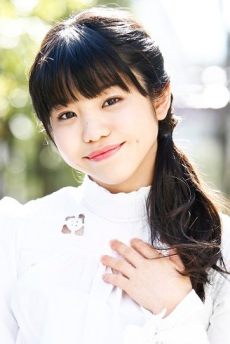
Hinata Satou

Kanade Yoisaki

Tomori Kusunoki

Ena Shinonome

Minori Suzuki

Emu Otori
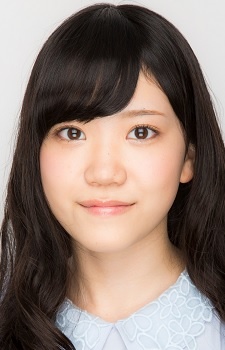
Hina Kino

Mafuyu Asahina
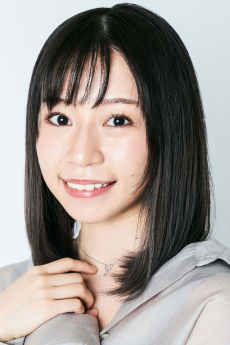
Rui Tanabe

Rui Kamishiro
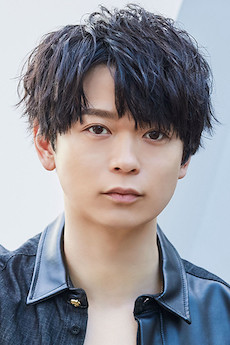
Shunichi Toki

Tsukasa Tenma

Daisuke Hirose

Nene Kusanagi

Machico

Akito Shinonome
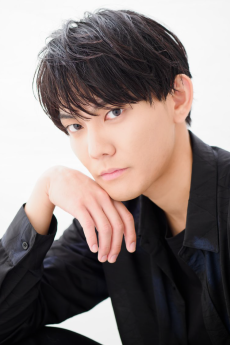
Fumiya Imai

Toya Aoyagi
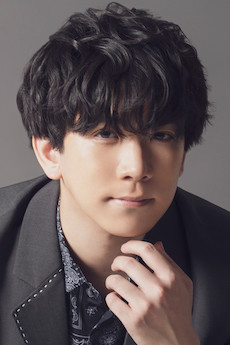
Kento Itou

Kohane Azusawa

Akina

An Shiraishi

Tomomi Jiena Sumi

Airi Momoi

Ai Furihata

Saki Tenma

Karin Isobe

Minori Hanasato

Yui Ogura
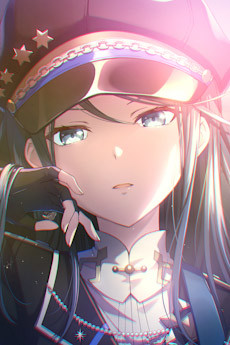
Ichika Hoshino

Ruriko Noguchi

Shizuku Hinomori
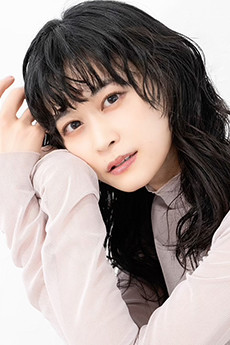
Rina Honizumi

Haruka Kiritani
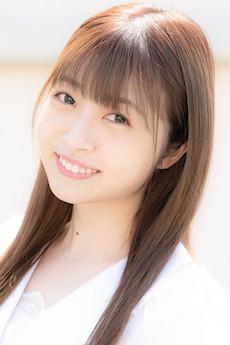
Mayu Yoshioka

Shiho Hinomori
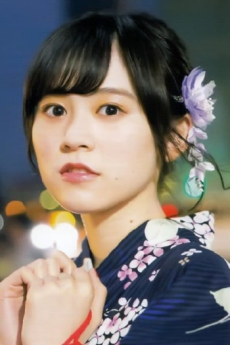
Yuki Nakashima

Honami Mochizuki

Reina Ueda
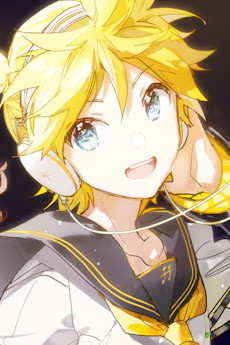
Len Kagamine

Asami Shimoda
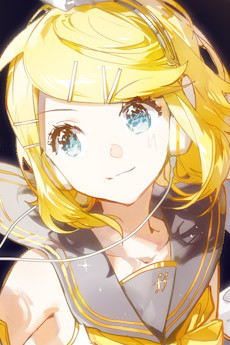
Rin Kagamine

Asami Shimoda
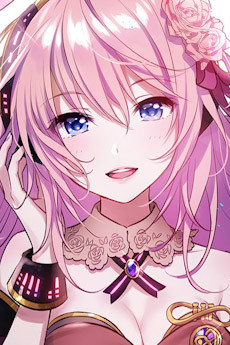
Luka Megurine

Yuu Asakawa

KAITO
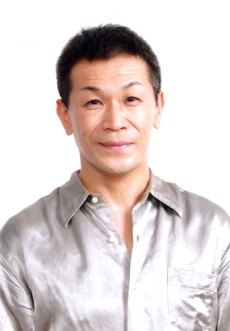
Naoto Fuuga
RELATED TO PROJECT SEKAI: KOWARETA SEKAI TO UTAENAI MIKU
REVIEWS

SwowoJonny
85/100A slow start that turns into a massive entertainment bombContinue on AniListIf you love music, this is a MUST WATCH 
It's NOT "VOCALOID the movie" 
People already have certain expectations of the film, which I'd like to address without spoilers. This isn't "VOCALOID the Movie." This is a film about Project Sekai, a video game in which several VOCALOIDs play a role.
But who is this film for? Do I need to know the game to do this?
Well, the film is for anyone who likes music. Nothing more. You don't know Miku? You don't know the film? Believe me, that's no reason to not watch the film. The film does a great job of providing any missing context. Who Miku is and what impact she has on the world becomes clear in the first few minutes of the film. And all the Sekai characters? You don't necessarily have to know them either. I went to the film with some friends who had no idea about Sekai. And they understood everything smoothly throughout the film and accepted the characters. While the pasts of all these characters are definitely a nice bonus for a lot of hidden content, they are definitely not required. I guarantee you'll like the characters without knowing what made them the way they are today.

A slow start for an heartwarming story (no spoilers) 
As mentioned, the movie starts really slow. But why? Well, the movie is about that one Miku appearing in the world, that can't reach the hearts of the people. This is how she gets to know the characters from the Sekai franchise, whom she befriends and from whom she learns how to improve her music. This naturally means that we first have to somehow connect all the characters to this Miku. It's tiring, but it's an element I don't know if it can really be improved. BUT (!) it's worth it. It's precisely these scenes in which we get all the individual characters on the big screen. This is great for Sekai fans because we see how the film has implemented them, and it's useful for new viewers because they get to know the characters briefly and succinctly.
I don't want to spoil the plot, of course, but it's a very nice plot. I wouldn't go too far in saying that half of my eight-person viewing party in the theater actually cried at the end. The film does a wonderful job of empathizing and, above all, using the music as an element that ultimately reaches your heart.

The music is key, the music is peak 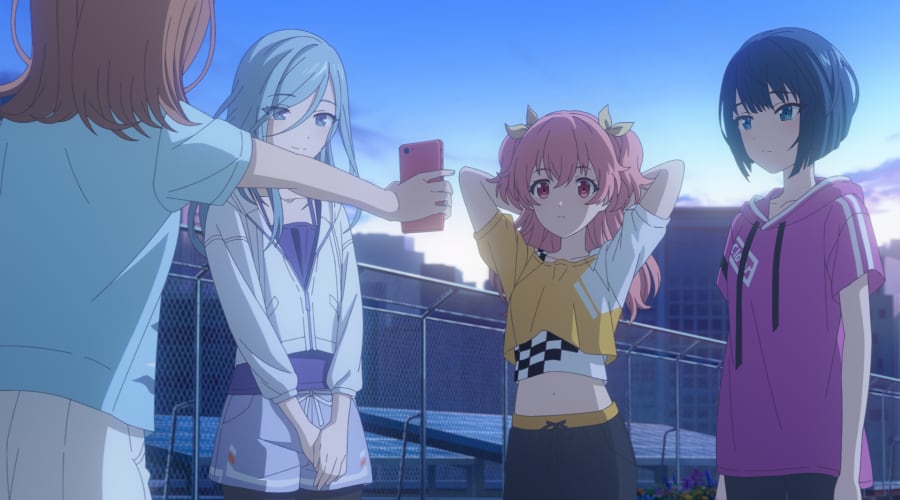
No VOCALOID fan? No problem. Many people who don't like VOCALOIDs musically are afraid to try the film because of this. But I can tell all of them that very few of the songs are actually VOCALOID. Most of the songs are by the real singers introduced in the video game. Wonderful bands that cover various genres and incorporate the film's basic message into the film in their own way. Personally, I strongly expected that I wouldn't like some of the songs... but that's not the case. All of the songs were a huge success for me, but that's just a side note. After all, musical taste is subjective. I still assume that everyone out there will find a song they like. That's what the different bands are for.
Also: If you are a VOCALOID fan, this movie will also statisfy you. After all, the VOCALOID songs are great too.

Pros and Cons 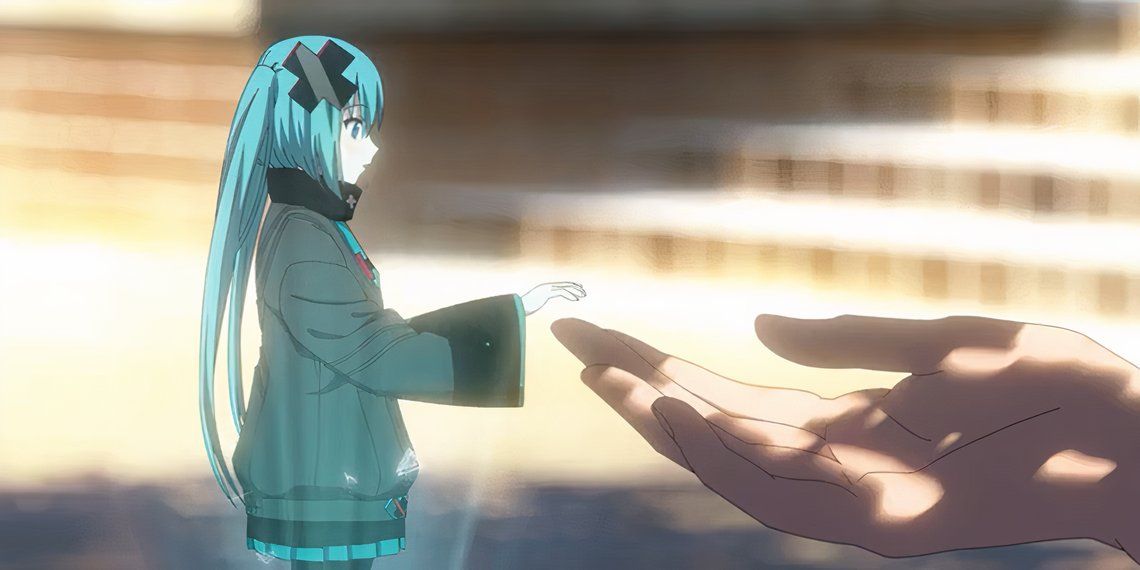
CON - slow start
CON - the VOCALOIDs sound awful, when they talk and don't singPRO + great music
PRO + satisfactory implementation of the characters
PRO + nice visuals
PRO + heartwarming story
PRO + great voice acting
PRO + awesome secret after the credits-- wait wha--?
Note: I watched the movie with german sub. The german cinema release was April 5th 2025.

YuiHirasawa39
56/100Primarily a Project SEKAI Movie - but Enjoyable for all Hatsune Miku FansContinue on AniListFirst of all – yes, this is a Project Sekai movie. The characters (excluding the titular Miku and her virtual singer friends) are from Project SEKAI: Colorful Stage! ft. Hatsune Miku, a Japanese rhythm game developed by Colorful Palette and published by Sega in Japan in 2020. The game was localized in English as Hatsune Miku: Colorful Stage! and given a worldwide release the following year. Unlike the Project DIVA series, Project Sekai focuses heavily on its original characters, of which there are many – and all the relevant ones are featured in this movie. And just to get this out of the way: This movie only licenses the Crypton Future Media voicebanks – aka KAITO, MEIKO, Hatsune Miku, Kagamine Rin and Len, and Megurine Luka. GUMI, Flower and friends miss the party, as do all of the SynthV offerings. Confused by all this? The main takeaway is that this movie does feature 6 of the most popular vocal synths we love, but there are a lot of original characters (literally 20) from the games that are prominently featured as well.
So – the logical question is – if you’re not a Project Sekai fan, should you watch this movie at all? As someone who has never been involved in the fandom, but has been a massive VOCALOID (we’ll return to this phrase later) fan for over a decade now, I think the answer is that it depends entirely on what you’re looking for. To be absolutely clear, this movie is about Miku, and to P.A. Works’ credit, thankfully mostly about her, and less so about the video game characters. I entered this film with the perspective that I frankly didn’t know very much about the massive cast of OCs, and still mostly enjoyed it despite this lack of knowledge. But if you’re going into this looking for the nuts and bolts of voice synth production, you’ll be mostly disappointed. This is a movie that has a typical story – and the focus is more on that story than the frankly impressive cast of actual vocal-Ps that contributed to its score. As someone who is not a native Project Sekai fan, my general takeaway is that you absolutely should watch this if you are, and while it’s perhaps slightly less enjoyable if you’re like me and coming in without prior knowledge of the original characters, you should have a good time regardless.
Phew. I intend for this review to be mostly free of plot spoilers, so let’s take a very quick look first at the basics. In the animation department, it’s pretty good. The animation is nice and fluid, and while there were no scenes that absolutely wow’d me, I appreciated the thought that went into the character and backgrounds, though there were a few of the latter that felt a bit more low-effort. There is some odd use of CGI (controversial I know) but thankfully it’s not incredibly sustained. Sound design is hard to comment on as I saw it in theater – but frankly I think some scenes were just way too loud compared with the rest of the score – not sure if this was an artifact of my specific production but I’d hope this is fixed if we get a home release.
This is normally the point in the review where I’d talk about the voice acting, and it was my single biggest takeaway from the film. All the original characters were voiced by human voice actors, both for their spoken lines and also their musical appearances. Most of the performances were solid, but I was unexpectedly really impressed by Noguchi Ruriko (VA for Hoshino Ichika), whose performance was definitely the standout for me. Again – I’m not at all familiar with the games, and frankly don’t have anything notable to say about her characterization – but I was genuinely impressed by her vocal performance. However, I have less nice things to say about the rest of the characters – the vocal synths themselves.
For the uninitiated, all of the “Virtual Singers,” the six characters mentioned in the first paragraph, are pieces of software. If you take a look at this film’s credits, you’ll see the base vocalist credited for each of the Virtual Singers: Fujita Saki for Miku, Shimoda Asami for Kagamine Rin and Len, Asakawa Yuu for Megurine Luka, Haigou Meiko for MEIKO, and Fuuga Naoto for KAITO. But, importantly, these humans did not directly voice any of their characters’ songs or lines in the film. While the base vocals were provided by these human voice actors, it’s up to a “producer” or a “VOCALOID-Producer” or “vocal-p” – a human – to construct the actual words that you hear in a song. Really, there’s three players involved in the creation of a Hatsune Miku song: Fujita Saki, the human who provided Miku’s base vocals, Crypton Future Media, the company that has produced the Hatsune Miku synthesizer software, and the human vocal-p themselves, who uses the software to put the vocals together to make Hatsune Miku sing. Thus, it’s entirely clear that the quality of these six characters’ lines hinges entirely on the person, the vocal-p, between the software and the output. You can think of the vocal-p as the musician that turns the instrument – aka Hatsune Miku – into the music she sings and the lines she speaks. And oh boy, do I have something to say about the latter.
To be frank, the tuning for all six of these characters’ spoken lines is probably some of the worst that I’ve ever heard in over 10 years of listening to this genre. To be clear – this is entirely subjective. Different people appreciate different “tuning” styles: the distinctive mark that each producer leaves on their virtual singer. But, in my opinion, the tuning exhibited for all of the spoken lines is so rudimentary it’s distracting. Most of their voices suffer from sounding extremely choppy, not just in a few places but consistently throughout the entire film. I know, I know – these are SINGING voice synthesizers, and they’re not primarily marketed as TALKING voice synthesizers. But you don’t need to listen to a ton of this music to understand that people have spent 18 years making Miku and her friends sound incredible when just speaking lines, and it’s absolutely flummoxing to me to think P.A. Works couldn’t have found someone with a little more experience to tune their licensed characters. That’s really it – the Virtual Singers just sound bad when they’re talking, which, unfortunately, is much of the film.
And here’s the really frustrating part – the studio (intelligently) sourced all of its score from established producers. The opening is fantastic production by two of the most longstanding, accomplished Hatsune Miku producers 40mP and sasakure.UK. These p’s styles mesh extremely well together – I’m actually listening to the OP as I write this review and I’m reminded why these two are rightly respected as much as they are. And – get this – there are SIX, yes, SIX songs by the face of modern Miku music – DECO*27 himself, all of which are arranged by other vocal-Ps, including my personal favorite, Giga. P.A. Works was clearly smart enough to know that they should contract, you know, actual vocal-Ps to create their movie’s music, but somehow not smart enough to find a premier tuner to actually tune the six Cryptonloids’ spoken lines. It’s infuriating.
And while I’m talking about the music, I can’t help but touch on one single other little nit-pick. Five of those six songs are not...voiced...by...the...virtual...singers. Yes, I can be rightly criticized here for intentionally missing the context behind this, but it’s just absolutely perplexing to me that they would contract literally the biggest name in the vocal synth space to compose 5 bangers, recruit 5 more producers to arrange the songs, and then not actually play the synthesizers’ versions in the film? What in the world? Don’t get me wrong – the vocals are provided by the original characters, who as far as I can gather do actually voice these songs in the in-game world, and their performances as shown in the film are enjoyable enough. But please...let this make sense somehow. Again, I’m not a native Project Sekai fan, and maybe this is exactly what I would have wanted if I was a part of that fandom, but someone who was a vocal-synth fan first, this just makes no sense to me.
Now that being said, the actual songs that the vocal synths do perform were probably the best part of the film for me. Without getting into spoiler territory, the plot of this film is basically the oldest, and in my opinion, the most poignant and storied question in this space. It’s one that people have been asking ever since Crypton Future Media finally got off the ground in the mid-00s: how do people connect to the music that their software enables? How can the producers reach their audience through Hatsune Miku as a medium – and perhaps more importantly – does Miku become something more than just an instrument or a piece of software when this occurs? It’s a thoroughly-discussed topic and for good reason, and you’ll find this at the crux of the film’s plot here – I enjoyed it and I hope you will too.
In conclusion – I enjoyed this movie, and I’d probably watch it again, if only to pick up on some of the cameos I missed the first time. But keep in mind this is a Project Sekai movie – it’s about Miku, but it’s more about the world of the game than it is about VOCALOID production. I did promise we’d return to that term, right? Yes. Hatsune Miku is not a VOCALOID – not any more. Before any of their most famous six were released, Crypton Future Media had paired with none other than Yamaha (!) to come up with the VOCALOID engine in 2004. 15 years later – the duo split, and Miku and friends are no longer VOCALOIDS. Theories range on why, but you won’t see a single overt reference to VOCALOID in this film. Why is this relevant, and why do I only circle back to this now? It’s because, in my mind, this is where the film finds its largest strength. Miku doesn’t need to be VOCALOID or have the support of the Yamaha giant to have meaning for her fans. You don’t need to be a hardcore VOCALOID fan to enjoy her music. You don’t have to be a Project Sekai fan to love her and what she represents for you. And – perhaps most importantly – you don’t need to “understand” her for her voice to reach you, through the producers that she speaks through, and I think that’s beautiful.

sweetamitie
90/100holy mother of hatsune peak-uContinue on AniListGeneral Observations:
- Delightful way to spend two hours. A very large portion of the movie I had a huge smile stuck to my face.
- Simple but effective. Conflict introduced, conflict explored, conflict resolved in a satisfying way. Doesn't say or try to imply anything particularly deep or thought-provoking, but it doesn't need to.
- Doesn't require an intimate knowledge of the game's characters or storylines to enjoy, though there are very minor callbacks and having a general idea of what goes on in the game definitely doesn't hurt.
- Movie has a slight Leo/need focus (This makes sense narratively and I'm not bothered by it).
- The production of this movie is filled to the brim with passion and appreciation for artists and musicians, with an obvious focus on Vocaloid producers. It's practically bleeding with it.
- Movie original discography brings its best, as expected. All five of the unit songs are evocative of their groups and their aesthetic. That said, Fire Dance is definitely my favorite. They really start that portion of the movie with a deafening bang that the rest of the songs can't measure up to in the same way for me.
- Relationships are a healthy mix of friendship and GL crumbs, with a small serving of family and BL crumbs on the side.
- The movie is carried on the idea that music has the capability to save and change lives. This is a theme that resonates deeply with me, but it likely won't be as impactful if you disagree. The film itself definitely whole-heartedly believes in it, which might be enough to convince you, at least for a bit. People find solace and hope in the simplest things, no matter how mundane they may seem. Oftentimes, it really is that easy.
Praises:
- Genuinely clever way of incorporating existing songs as inserts: not just Gunjo Sanka, but the clips of songs from other producers as well.
- Song choreography was energetic. Felt refreshing compared to the choreo in the 3DMV's in the actual game which can be... lackluster at times.
- Tsukasa's presence essentially being dedicated to comic relief. Objectively the best use of his limited screentime in a movie that's supposed to be more or less evenly focused on each character.
- Amazing cinematography, especially in the scenes in depressed Miku's SEKAI. Reminded me of Revue Starlight at times.
Complaints:
- Members of groups didn't intermingle at all. Even when they're all summoned at the same time to depressed Miku's SEKAI, they literally cannot perceive anyone outside of their group. I thought this was kind of a shame given that something I like about the game's storylines is the interaction of characters between groups that extends to music collaboration and being a part of the "friends with the Virtual Singers" club.
- (Minor) Akito seemed to take priority over Kohane as a leader figure in certain VBS-focused portions. Give the spotlight back to my hamster, damn it. /j
- (Minor) Balance between groups was ALMOST perfect, MMJ and WxS could've used just a teensy pinch more focus each. I suppose that's the downside to the movie being slightly Leo/need focused (which I don't mind, again).
Theater Experience & Miscellaneous:
- English subtitles by Deven Neel. I enjoyed them and appreciated the song translations. I thought it could've done with some proper karaoke styling because I'm a fansubber myself and deranged, but it was a solid 7/10 overall.
- Everyone in the theater looked like they belonged in the GSA, including me and my girlfriend. That is a high compliment. There were two teens cosplaying as Rin and Len in the audience that were in front of us in line to buy tickets.
- I was worried because there was a Lot of yapping during the pre-show, but the audience was very well-behaved. I was very grateful for this after hearing the horror stories of what happens in the showings of the Minecraft movie.
- About two minutes into the movie the theater lights weren't dimming and we were all silently confused. A theater worker walked across the aisles to turn them off manually and we genuinely whooped and cheered in gratitude. The next time we would whoop and cheer would be during the after show when Miku is directly addressing us.
- The song during the after show didn't feel the appropriate vibe to get up and be active, but I did clap in time. My girlfriend got out her shitty tiny Precure Miracle Light that barely works and waved it around a bit which was the closest we got to a glowstick.
Final Thoughts:
- After we got out of the movie we got little cardboard flyers with serial codes on the back. If this doesn't give me ten thousand crystals upon redemption then I don't want it. (joke)
- Why did they get Deco*27 to compose like ten songs for this movie. Do they have him trapped in the basement or something
- I love you movies I love you music I love you Hatsune Miku
SIMILAR ANIMES YOU MAY LIKE
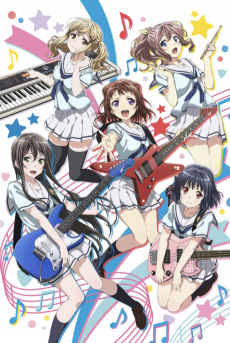 ANIME ComedyBanG Dream!
ANIME ComedyBanG Dream! ANIME DramaGIRLS BAND CRY
ANIME DramaGIRLS BAND CRY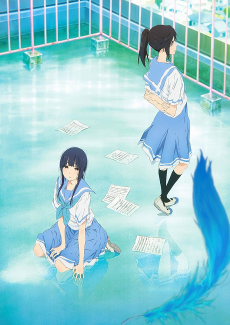 MOVIE DramaLiz to Aoi Tori
MOVIE DramaLiz to Aoi Tori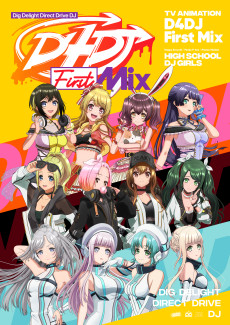 ANIME MusicD4DJ First Mix
ANIME MusicD4DJ First Mix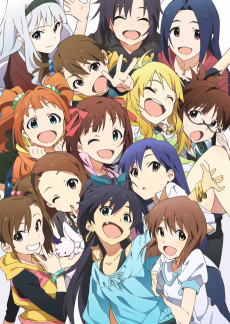 ANIME ComedyTHE IDOLM@STER
ANIME ComedyTHE IDOLM@STER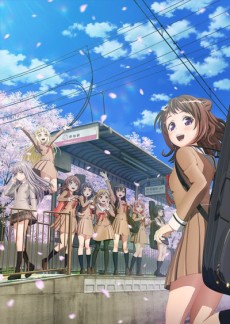 ANIME ComedyBanG Dream! 2nd Season
ANIME ComedyBanG Dream! 2nd Season
SCORE
- (3.85/5)
TRAILER
MORE INFO
Ended inJanuary 17, 2025
Main Studio P.A.WORKS
Favorited by 441 Users
Hashtag #劇場版プロセカ



